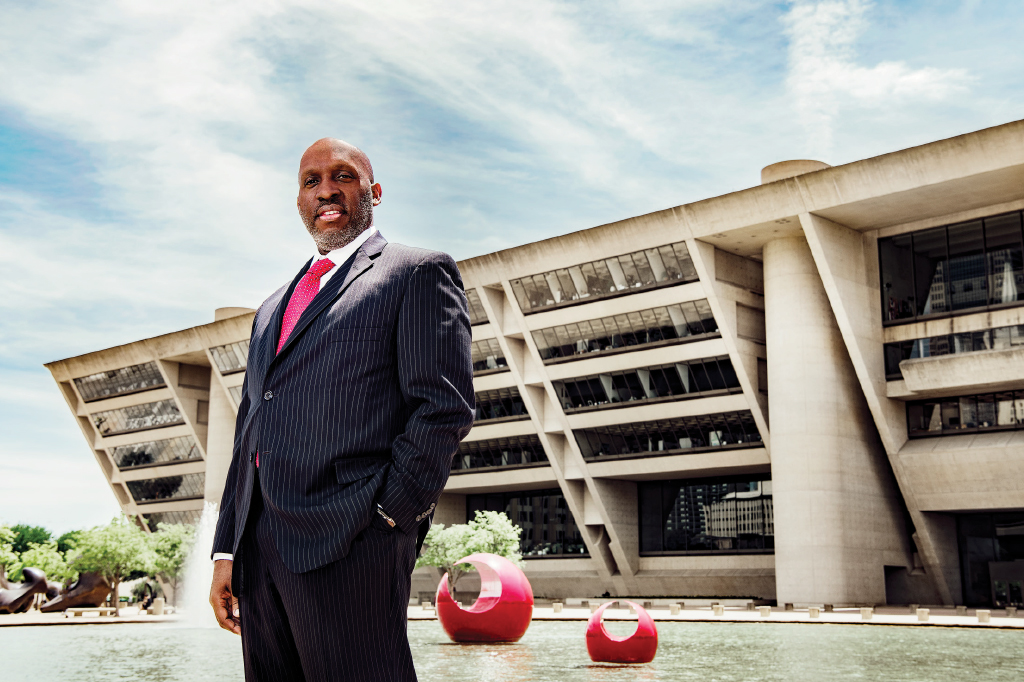The councilwoman is struggling to convey exactly why she and her colleagues have so much confidence in Dallas’ new city manager, T.C. Broadnax. He’s been on the job just a few months, but she says there is just something about him. That he, well—
“It’s hard to describe,” she says. “It’s just that, look, when you’re talking about something to him, there is—it’s not an arrogance—there is an awareness. He isn’t nodding because he’s pretending to listen. He’s nodding because he understands the problem, and he knows how he wants to tackle it. It’s like I always expect him to put his hand on my shoulder and say, ‘Don’t worry, I got this.’ ”
The first 100 days into his job as Dallas city manager, that reassuring look—that late-in-the-game Dirk Nowitzki steely stare—is the reassuring trait most obvious to council members and City Hall regulars. But there have been other signs of a new standard of excellence, which I would define at City Hall as meaning “professional competency.”
Perhaps most important of these signs is that he is injecting new blood into hallways that have long been populated with the same faces. (Just look at the endless lists of names of 25-year-plus employees hanging on the walls.) Broadnax, a one-time Tacoma, Washington, city manager, just hired a former colleague, Nadia Chandler Hardy, to become chief of community services (she held a similar position in Tacoma). He also wooed Jon Fortune from Denton, where he developed a sterling reputation over 25 years, to be an assistant city manager here. He hired Majed Al-Ghafry, an engineer and transportation expert, as an assistant city manger to oversee sustainable development and mobility. And he hired Raquel Favela, previously a regional director for the National Development Council, as a chief over economic development, planning and urban design, and fair housing. These people are stars in their respective fields. All outsiders.
That Broadnax is drawing talent from smaller cities could be considered a problem. Denton and Tacoma are, respectively, about one-tenth and one-sixth the size of Dallas. But council members I talked to were unconcerned. “It’s fine,” said District 9 Councilman Mark Clayton. “I don’t care if they’re from a Power Five conference, as long as T.C. is comfortable. He’s ultimately the one who’s held responsible.”
If Broadnax’s strength is his “I got this, the buck stops here” approach, it could also be what makes him most vulnerable. At the very least, that attitude puts a target on his back when the big-money players don’t get buy-in for whatever latest shiny development toy has caught their eye. During a recent D Magazine panel discussion on local politics, longtime Dallas Observer City Hall chronicler Jim Schutze put it this way: “A City Hall insider said to me, ‘Hey! This guy thinks he’s in charge!’ ” The implication: eventually Broadnax’s honeymoon will end, and the shadowy Powers That Be will put him in his place.
Two problems with that line of thinking. One, it fits a little too neatly into the tired narrative about big-money forces getting whatever they want at City Hall, a belief that ignores the strong possibility that Dallas government has done some dumb things the past decade not because it’s controlled by evil forces but because, collectively, the city managers and assistant city managers who run the city haven’t been very good at their jobs. Just saying. It’s a possibility.
Two, you want to tell T.C. Broadnax he ain’t in charge? That he needs to listen to rich guys and not the communities that make up the city? Good luck with that.
“Not under my watch,” Broadnax says. He’s at a small conference table in his fourth-floor office, his large, cantilevered windows overlooking the plaza that runs along Marilla Street. His press officers and assistants left the room so we could talk in private, a sign of a city official who has confidence in his ability to field any question without a minder. Broadnax describes a crucial difference between the way he operated in Tacoma and San Antonio before that, and how he thinks City Hall has too long operated in Dallas. Specifically, that you don’t develop policy within the walls of power and then ask residents what they think of those plans. You talk to people first, get their input before you tell them what you think a plan should look like, whether it’s a way to attack the homeless problem or simply bring streets up to code. You want citizens to see their ideas in the solution.
“You listen,” he says. “If it’s a good thing for the community and it’s within your mission and goal, you figure out how we get it done, and, I think, again, you get the benefit of being able to get to hear from all sides and factions, and build consensus on what’s the best way to go. There may be people who are not in agreement, but they can at least appreciate that you spent the time and you justified and shared with them why you could not get their ideas in place. To me, it is a process and an evolution I think this City Hall building has to go through.”
Something tells me it’s not so much the building that has to go through the process and evolution. It’s the people who live at City Hall, the bureaucrats who’ve spent decades swearing fealty to the false gods of signature bridges and floodway toll roads. They will be hard to convince, even harder to uproot.
“I do believe there is some excitement along with—some nerves as it relates to me coming in here,” Broadnax says. “I think the way I go about doing my job, quite honestly, is very authentic and real, and so I don’t tell you anything in private that I couldn’t tell you in public. I probably said some things out in public that folks are surprised comes out of a city manager’s mouth, but if you ask me a question, I think you deserve an honest answer, whether you agree with it or not. And if you watched any of the Council meetings that I’ve been at, those are some interesting meetings for me. I think just the Council getting used to me and my style and me getting used to their style—I’d say it’s a continued work in progress.”
That it has been. At his first City Council meeting, in February, Broadnax listened as Mayor Mike Rawlings championed some sort of homelessness-solving city-county task force/regional oversight organizational commission. There was much arguing about its merits and lack of same, before the mayor finally asked the new city manager what he thought about the idea.
To everyone’s surprise, Broadnax told him what he thought. Calling the idea “disturbing,” he concluded, “You don’t need a commission to lay out those kinds of things. Those are the responsibilities of the city staff.”
To recap: a new city manager told the mayor he didn’t like his idea. He acted as though he worked for the Council, not the mayor. He wanted the accountability, asked for it, rather than letting another commission of the well-intentioned compromise itself to ineffectiveness. Show me the last time that happened in Dallas.
That is not to say Broadnax’s first 100 days have been controversy-free. The city’s lack of 911 emergency call center oversight was put on full display after long wait times were reported, and the city’s emergency warning system was hacked, creating an overnight cacophony of sirens throughout Dallas. But those were both inherited issues, the sort of foundational fault lines Broadnax was brought in to repair. That’s what he wants people to be excited about, the challenge of fixing what is broken.
“In some cases, there’s been a few [city staff] who have lost that fire,” Broadnax says. “And it’s probably not because of them. It’s probably because of people that sit around the table with them.” He says, in so many words, that they can get on the T.C. train or it will pass them by. “[Because] whether I’m here or not, the changes that I’m hoping to make and how we orient ourselves to serve the public will be something that, when I’m gone, my goal is that people will go, ‘Well, T.C. may not be here, but what he was trying to do are the right things. We’re not going to let anybody else try to take us back, because we don’t like where back was.’ ”
Which sure sounds like a guy who thinks he’s in charge.
“It’s hard to describe,” she says. “It’s just that, look, when you’re talking about something to him, there is—it’s not an arrogance—there is an awareness. He isn’t nodding because he’s pretending to listen. He’s nodding because he understands the problem, and he knows how he wants to tackle it. It’s like I always expect him to put his hand on my shoulder and say, ‘Don’t worry, I got this.’ ”
The first 100 days into his job as Dallas city manager, that reassuring look—that late-in-the-game Dirk Nowitzki steely stare—is the reassuring trait most obvious to council members and City Hall regulars. But there have been other signs of a new standard of excellence, which I would define at City Hall as meaning “professional competency.”
Perhaps most important of these signs is that he is injecting new blood into hallways that have long been populated with the same faces. (Just look at the endless lists of names of 25-year-plus employees hanging on the walls.) Broadnax, a one-time Tacoma, Washington, city manager, just hired a former colleague, Nadia Chandler Hardy, to become chief of community services (she held a similar position in Tacoma). He also wooed Jon Fortune from Denton, where he developed a sterling reputation over 25 years, to be an assistant city manager here. He hired Majed Al-Ghafry, an engineer and transportation expert, as an assistant city manger to oversee sustainable development and mobility. And he hired Raquel Favela, previously a regional director for the National Development Council, as a chief over economic development, planning and urban design, and fair housing. These people are stars in their respective fields. All outsiders.
That Broadnax is drawing talent from smaller cities could be considered a problem. Denton and Tacoma are, respectively, about one-tenth and one-sixth the size of Dallas. But council members I talked to were unconcerned. “It’s fine,” said District 9 Councilman Mark Clayton. “I don’t care if they’re from a Power Five conference, as long as T.C. is comfortable. He’s ultimately the one who’s held responsible.”
If Broadnax’s strength is his “I got this, the buck stops here” approach, it could also be what makes him most vulnerable. At the very least, that attitude puts a target on his back when the big-money players don’t get buy-in for whatever latest shiny development toy has caught their eye. During a recent D Magazine panel discussion on local politics, longtime Dallas Observer City Hall chronicler Jim Schutze put it this way: “A City Hall insider said to me, ‘Hey! This guy thinks he’s in charge!’ ” The implication: eventually Broadnax’s honeymoon will end, and the shadowy Powers That Be will put him in his place.
“When I’m gone, my goal is that people will go, ‘Well, T.C. may not be here, but what he was trying to do are the right things.’ ”
Two problems with that line of thinking. One, it fits a little too neatly into the tired narrative about big-money forces getting whatever they want at City Hall, a belief that ignores the strong possibility that Dallas government has done some dumb things the past decade not because it’s controlled by evil forces but because, collectively, the city managers and assistant city managers who run the city haven’t been very good at their jobs. Just saying. It’s a possibility.
Two, you want to tell T.C. Broadnax he ain’t in charge? That he needs to listen to rich guys and not the communities that make up the city? Good luck with that.
“Not under my watch,” Broadnax says. He’s at a small conference table in his fourth-floor office, his large, cantilevered windows overlooking the plaza that runs along Marilla Street. His press officers and assistants left the room so we could talk in private, a sign of a city official who has confidence in his ability to field any question without a minder. Broadnax describes a crucial difference between the way he operated in Tacoma and San Antonio before that, and how he thinks City Hall has too long operated in Dallas. Specifically, that you don’t develop policy within the walls of power and then ask residents what they think of those plans. You talk to people first, get their input before you tell them what you think a plan should look like, whether it’s a way to attack the homeless problem or simply bring streets up to code. You want citizens to see their ideas in the solution.
“You listen,” he says. “If it’s a good thing for the community and it’s within your mission and goal, you figure out how we get it done, and, I think, again, you get the benefit of being able to get to hear from all sides and factions, and build consensus on what’s the best way to go. There may be people who are not in agreement, but they can at least appreciate that you spent the time and you justified and shared with them why you could not get their ideas in place. To me, it is a process and an evolution I think this City Hall building has to go through.”
Something tells me it’s not so much the building that has to go through the process and evolution. It’s the people who live at City Hall, the bureaucrats who’ve spent decades swearing fealty to the false gods of signature bridges and floodway toll roads. They will be hard to convince, even harder to uproot.
“I do believe there is some excitement along with—some nerves as it relates to me coming in here,” Broadnax says. “I think the way I go about doing my job, quite honestly, is very authentic and real, and so I don’t tell you anything in private that I couldn’t tell you in public. I probably said some things out in public that folks are surprised comes out of a city manager’s mouth, but if you ask me a question, I think you deserve an honest answer, whether you agree with it or not. And if you watched any of the Council meetings that I’ve been at, those are some interesting meetings for me. I think just the Council getting used to me and my style and me getting used to their style—I’d say it’s a continued work in progress.”
That it has been. At his first City Council meeting, in February, Broadnax listened as Mayor Mike Rawlings championed some sort of homelessness-solving city-county task force/regional oversight organizational commission. There was much arguing about its merits and lack of same, before the mayor finally asked the new city manager what he thought about the idea.
To everyone’s surprise, Broadnax told him what he thought. Calling the idea “disturbing,” he concluded, “You don’t need a commission to lay out those kinds of things. Those are the responsibilities of the city staff.”
To recap: a new city manager told the mayor he didn’t like his idea. He acted as though he worked for the Council, not the mayor. He wanted the accountability, asked for it, rather than letting another commission of the well-intentioned compromise itself to ineffectiveness. Show me the last time that happened in Dallas.
That is not to say Broadnax’s first 100 days have been controversy-free. The city’s lack of 911 emergency call center oversight was put on full display after long wait times were reported, and the city’s emergency warning system was hacked, creating an overnight cacophony of sirens throughout Dallas. But those were both inherited issues, the sort of foundational fault lines Broadnax was brought in to repair. That’s what he wants people to be excited about, the challenge of fixing what is broken.
“In some cases, there’s been a few [city staff] who have lost that fire,” Broadnax says. “And it’s probably not because of them. It’s probably because of people that sit around the table with them.” He says, in so many words, that they can get on the T.C. train or it will pass them by. “[Because] whether I’m here or not, the changes that I’m hoping to make and how we orient ourselves to serve the public will be something that, when I’m gone, my goal is that people will go, ‘Well, T.C. may not be here, but what he was trying to do are the right things. We’re not going to let anybody else try to take us back, because we don’t like where back was.’ ”
Which sure sounds like a guy who thinks he’s in charge.
Get the D Brief Newsletter
Dallas’ most important news stories of the week, delivered to your inbox each Sunday.






